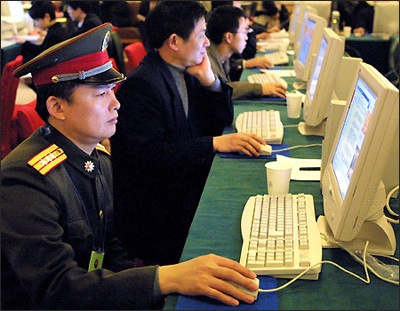 The irritability evident in exchanges between China and the United States on cyberwarfare masks an unpleasant truism about espionage in the conduct of international relations. This undoubtedly is the issue arising from Google’s allegation that its computers and those of some 30 other companies in sensitive industries had been penetrated. Google did not accuse the Chinese state, saying only that the attacks came from China, although the source had been traced by its engineers to seven servers in Taiwan. The company had made this a public contest in conjunction with its demand that China cease censoring googled information in its Chinese operations.
The irritability evident in exchanges between China and the United States on cyberwarfare masks an unpleasant truism about espionage in the conduct of international relations. This undoubtedly is the issue arising from Google’s allegation that its computers and those of some 30 other companies in sensitive industries had been penetrated. Google did not accuse the Chinese state, saying only that the attacks came from China, although the source had been traced by its engineers to seven servers in Taiwan. The company had made this a public contest in conjunction with its demand that China cease censoring googled information in its Chinese operations.
In spying as sophisticated as that conducted through computing, an American official engaged in the Google case said the forensics were “difficult” to pin down. By that he meant perpetrators could “mask their involvement or disguise it as another country’s”. A retaliation triggered could target the wrong country. The subtext: Be careful pointing fingers; this is uncharted territory.
China has denied it was the hacker, instead responding to U.S. Secretary of State Hilary Clinton’s call for an “investigation” with a disclosure that Chinese websites and computers had consistently been hacked. It provided dates and numbers, and said a decent percentage of attacks was of U.S. origin.
The squabble will not end in anything like a conclusion that either the U.S. or China could accept with a straight face. If a roomful of reasonably clued-in business and government people were asked if they thought the Chinese state was the culprit in the Google security breach, not clever individuals or attack clusters, the answer invariably would be: “Yes.” If they were then asked if the intelligence agencies of America or Russia or Israel engaged in cyberespionage, the answer would be: “But of course.” Espionage is a lively undertaking among powerful states — in military technology, commercial secrets, designs and research formula, trade and capital, even government negotiating positions on any imaginable issue. It just got livelier in the past decade because the computer cuts out laborious and often clumsy on-site intervention. The newest allegation to surface of assumed Chinese involvement is the hacking of oil companies’ computer systems, including those of ExxonMobil.
None of this is to impute persistent Chines denials in the Google incident to a totalitarian state’s dark side. Without the evidence and Google’s coyness about disclosing more information, the U.S. government will have to satisfy itself with its démarche that China “investigate” and “explain”. Nothing should be done that would damage a relationship that will be setting the pace and direction for the world this century.
Via The Straits Times